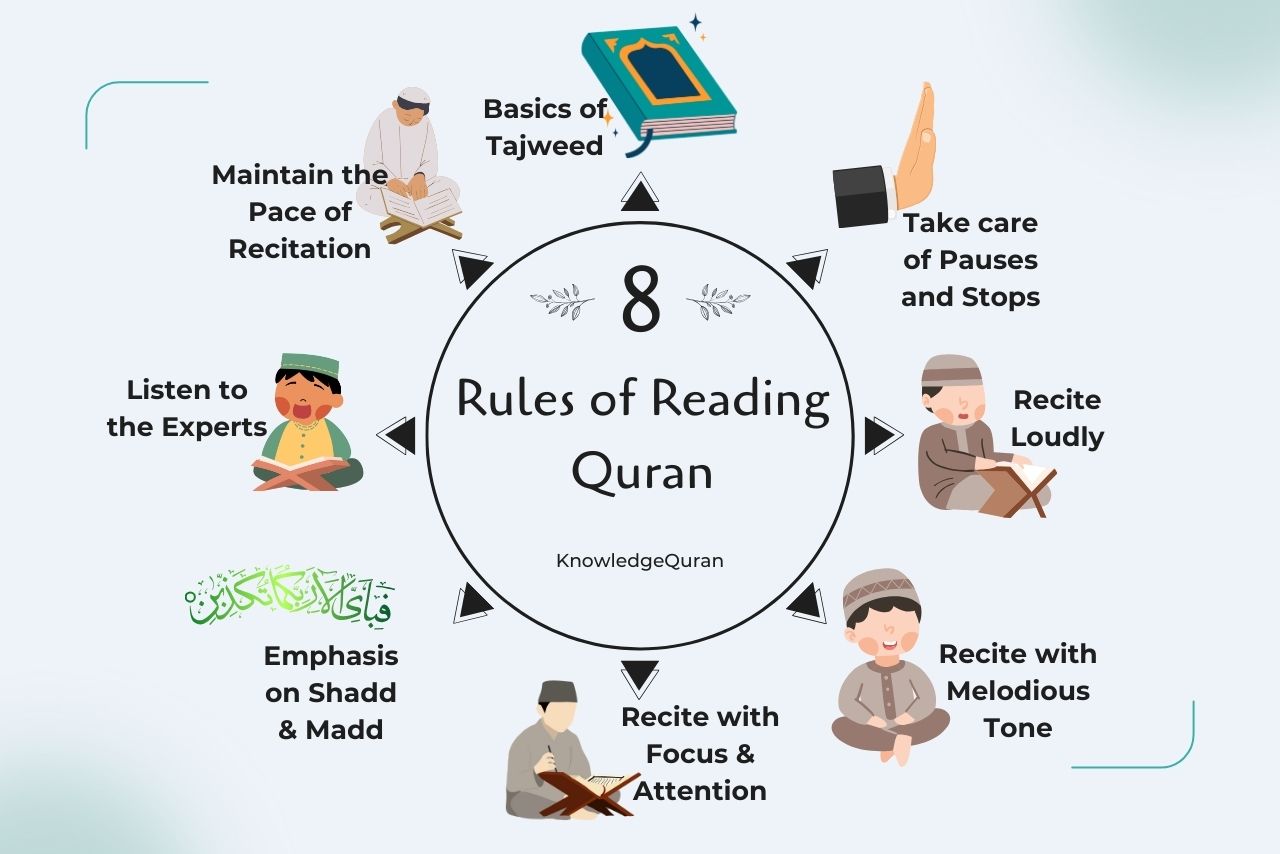How to Read Quran with Precision and Reverence
Every Muslim believes in the Quran and feels a deep sense of reverence and attachment to it as a religious duty. This devotion manifests in various ways within society, such as completing the Quran for blessings or keeping it in homes and workplaces for prosperity. Many different practices are adopted to seek benefit from the Quran without focusing on how to read Quran correctly.
However, while these expressions of love, reverence, and attachment to the Quran are important, it is crucial to remember that the Quran was revealed for far more significant purposes. The Quran has certain fundamental rights that every Muslim must fulfill. These rights include believing in the Quran, reading it correctly, reflecting on its meanings, following its commands, and striving Here, we focus on just one of these rights: How to read Quran correctly?
How to Read Quran Correctly?
The Quran is the holy book of Islam, revealed in Arabic, and is meant to be recited with precision and care. Accurate Quran reading ensures the correct delivery of the Quranic message and enhances one’s spiritual experience. Moreover, Allah has placed peace and comfort in the recitation of Quran. Allah Almighty says in the Quran:
وَرَتِّلِ ٱلْقُرْءَانَ تَرْتِيلًا
“And recite the Quran with measured recitation.” (Muzzammil:4)
In linguistic terms, the meaning of Tartil is to recite clearly and distinctly, while in Islamic law, it refers to the practice of adhering to some principles during recitation. Hazrat Shah Abdul Aziz Muhaddith Dehlvi (RA), in his commentary on the above-mentioned verse, explained how to read Quran correctly. These Quran reading rules should be kept in mind while reading the Quran:

1. Tajweed
To recite the Quran correctly, it is essential to have knowledge of the Basics of Tajweed. This ensures that the pronunciation of letters is accurate and that the meanings and interpretations are not altered due to incorrect pronunciation. Imam Ibn al-Jazari described as reading the Quran with tajweed as absolutely important and it is a sin to not apply tajweed on Quran.
2. Articulation of Letters
Each letter should be pronounced from its proper place of articulation so that its sound is completely distinct and clear from other letters. For example, “ط” should not be pronounced as “تا,” and “ظا” should not be pronounced as “ز.” In a hadith about reading Quran it is narrated by Hazrat Umm Salama (may Allah be pleased with her) that:
“Each letter of Prophet (PBUH) recitation was distinct and clear”

3. Pauses and Stops
Pausing correctly during Quranic recitation is crucial to avoid incorrect joining or separating of words, which could change the meaning of the text. Incorrect pauses or unnecessary joining can also lead to a change in meaning. Read in detail, the stop signs and pauses in Quran.
4. Loud Recitation
Raising the voice slightly during recitation helps the words of the Quran travel from the tongue to the ears and from there to the heart, creating a sense of longing and fear in the heart, which is the purpose of recitation.
5. Melodious Tone
Beautify your voice so that it carries a sense of sorrow and has a quick impact on the heart. Reciting the Quran slowly and with correction and melodious voice brings peace and refreshment to the heart. As Prophet PBUH said “The hearts become rusted like iron when water touches it.” The companions asked, “What is the remedy to remove this rust from the hearts?” He replied, “By remembering death frequently and by reciting the Quran”.
6. Emphasis on Shaddah and Madd
Paying proper attention to Shaddah (emphasis) and Madd (elongation) at their appropriate places is important, as these highlight the grandeur of the Divine Speech. When Hazrat Anas (may Allah be pleased with him) was asked about the recitation of the Prophet Muhammad (peace be upon him), he said:
“The recitation of the Messenger of Allah was with measured tones.” He then recited “Bismillah-ir-Rahman-ir-Raheem,” stretching out the words “Allah,” “Rahman,” and “Raheem” with lengthened pronunciation (Bukhari).
7. Focused Attention
When reciting or hearing verses about Hell and its punishments or Paradise and its blessings, pause briefly, seek refuge from Hell, and ask for Paradise. For verses that contain a command to make a supplication or remembrance, at least recite that supplication or remembrance once. For example, say: “Rabbi zidni ilma” (O my Lord, increase me in knowledge), Ameen. In summary, recitation should not merely be the articulation of words; it should be done with reflection and contemplation.
8. Listening Attentively
To recite the Quran correctly, listen attentively to its recitation according to the prescribed rules and strive to recite the Quran in the same manner.

9. Pace of Recitation
Do not recite the Quran too quickly. Instead, pronounce each word slowly and pause after each verse, so that the mind fully comprehends the meanings and messages of the Divine Speech. When the attributes of Allah are mentioned, let His greatness and awe overwhelm the heart. When His mercy is mentioned, let the heart overflow with gratitude. When His anger and punishment are mentioned, let the heart tremble with fear. When something is commanded or forbidden, understand what is being commanded or prohibited.
Reward and Benefits of Reading the Quran Correctly
The preferred way of reading the Quran is to read it slowly and melodiously, with clear and precise pronunciation of each word so that the listener can easily understand. For each letter recited from the Holy Quran, Allah promises ten rewards. It is narrated from Hazrat Abdullah bin Masood (RA) that the Messenger of Allah (PBUH) said:
“Whoever recites one letter from the Book of Allah will receive one reward, and each reward will be multiplied by ten. I do not say that Alif-Lam-Meem is one letter, but Alif is a separate letter, Lam is a separate letter, and Meem is a separate letter.” (Tirmidhi)
Conclusion
In conclusion, understanding how to read Quran correctly is not only a source of reward but also a duty for every Muslim to learn the principles of correct recitation and make it a regular practice. Let’s meet our expert reciter and know how do you read the Quran ?







